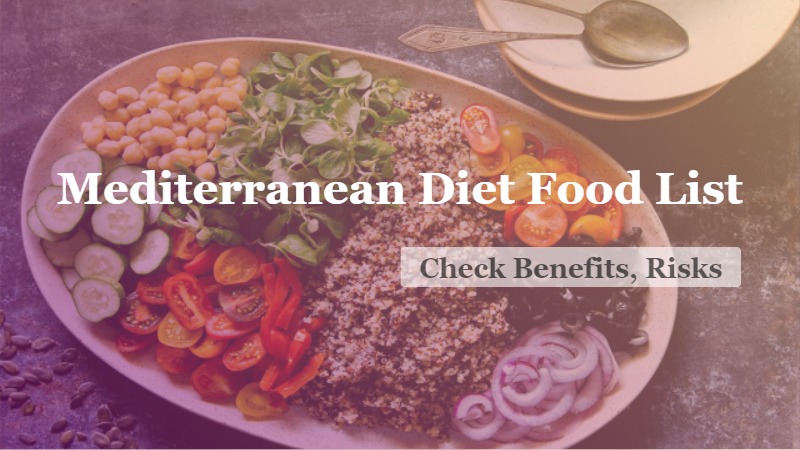
The Mediterranean diet is a dietary pattern inspired by the traditional eating habits of countries bordering the Mediterranean Sea. It is renowned for its potential health benefits, including promoting heart health, weight management, and reducing the risk of chronic diseases. Mediterranean diet food list comprises of whole foods, lean proteins, healthy fats and a variety of fruits and vegetables. Here are some common foods typically found in a Mediterranean diet, also check the benefits and risks associated with it.
- 1 Mediterranean Diet Food List
- 1.1 Fruits and Vegetables
- 1.2 Whole Grains
- 1.3 Legumes and Nuts
- 1.4 Healthy Fats
- 1.5 Lean Proteins
- 1.6 Dairy and Dairy Alternatives
- 1.7 Herbs and Spices
- 1.8 Beverages
- 1.9 Sweets (in moderation)
- 1.10 Seafood
- 1.11 Snacks
- 1.12 Traditional Mediterranean Dishes
- 1.13 Condiments and Flavorings
- 1.14 Mediterranean Diet Food Benefits
- 1.15 Risks Associated with Mediterranean Diet
The Mediterranean diet places an emphasis on consuming whole, minimally processed foods and avoiding highly processed and sugary items. It’s important to note that the Mediterranean diet is not just about the individual foods but also about the overall pattern of eating and lifestyle. It encourages enjoying meals with family and friends, being physically active, and practicing mindful eating.
Also Read: Carnivore Diet Food List
Mediterranean Diet Food List
Fruits and Vegetables
- Tomatoes
- Leafy greens (spinach, kale, arugula)
- Bell peppers
- Cucumbers
- Eggplants
- Zucchini
- Onions
- Garlic
- Berries (strawberries, blueberries, raspberries)
- Citrus fruits (oranges, lemons, grapefruits)
- Grilled eggplant
- Grilled zucchini
- Grilled bell peppers
Whole Grains
- Whole wheat bread
- Whole grain pasta
- Brown rice
- Quinoa
- Farro
- Bulgur
- Oats
- Whole grain cereals (oatmeal, muesli)
- Whole grain breadsticks
Legumes and Nuts
- Chickpeas
- Lentils
- Beans (black beans, kidney beans, pinto beans)
- Almonds
- Walnuts
- Pistachios
Healthy Fats
- Olive oil (extra virgin)
- Nuts (almonds, walnuts)
Lean Proteins
- Fish (salmon, sardines, mackerel, trout)
- Poultry (chicken, turkey)
- Eggs
- Legumes (beans, lentils, chickpeas)
- Nuts and seeds (walnuts, almonds, flaxseeds)
Dairy and Dairy Alternatives
- Greek yogurt
- Cheese (feta, goat cheese)
- Plant-based milk alternatives (almond milk, oat milk)
Herbs and Spices
- Basil
- Oregano
- Rosemary
- Thyme
- Mint
- Garlic
- Cinnamon
Beverages
- Water
- Red wine (in moderation)
- Herbal teas (chamomile, mint, sage)
- Espresso or Greek coffee
- Arak or ouzo (anise-flavored alcoholic beverages)
Sweets (in moderation)
- Fresh fruit
- Honey
- Dark chocolate
Seafood
- Octopus
- Shrimp
- Calamari
- Clams
- Mussel
Snacks
- Hummus with whole wheat pita bread
- Greek yogurt with honey and nuts
- Trail mix with nuts and dried fruits
Traditional Mediterranean Dishes
- Greek salad (with tomatoes, cucumbers, olives, feta cheese)
- Caprese salad (tomatoes, mozzarella cheese, basil)
- Ratatouille (a vegetable stew)
- Paella (a Spanish rice dish with saffron, vegetables, and seafood or meat)
- Tzatziki (yogurt-based sauce with cucumbers and garlic)
- Tabouleh (a salad made with bulgur, parsley, tomatoes, and mint)
- Falafel (deep-fried chickpea or fava bean patties)
- Bruschetta (toasted bread topped with tomatoes, garlic, and olive oil)
- Greek moussaka (eggplant and meat casserole)
- Spanakopita (Greek spinach and feta pie)
Condiments and Flavorings
- Balsamic vinegar
- Lemon juice
- Herbs and spices (thyme, oregano, basil, rosemary)
- Red pepper flakes
Remember, the Mediterranean diet is not rigid and can vary based on regional and cultural differences. The focus should be on incorporating a variety of whole, nutrient-rich foods, and enjoying meals in a balanced and mindful way. While the foods listed above are commonly associated with the Mediterranean diet, it’s important to personalize your diet to suit your preferences, dietary needs, and lifestyle.
Mediterranean Diet Food Benefits
Numerous studies have shown that the Mediterranean diet offers several health benefits:-
- Heart Health: One of the primary benefits of the Mediterranean diet is its positive impact on heart health. It has been associated with a reduced risk of heart disease, stroke, and cardiovascular mortality. The diet is rich in monounsaturated fats (found in olive oil), which can help lower LDL (“bad”) cholesterol levels.
- Weight Management: The Mediterranean diet encourages the consumption of nutrient-dense foods like fruits, vegetables, whole grains, nuts, and seeds. These foods are generally lower in calories and higher in fiber, helping with weight management and appetite control.
- Reduced Risk of Chronic Diseases: Following a Mediterranean diet has been linked to a lower risk of chronic diseases, including type 2 diabetes, certain types of cancer (such as breast and colorectal cancer), and neurodegenerative conditions like Alzheimer’s disease.
- Improved Blood Sugar Control: The diet’s emphasis on complex carbohydrates from whole grains, legumes, and vegetables, along with the consumption of healthy fats, can contribute to better blood sugar control and reduced insulin resistance.
- Anti-Inflammatory Effects: The Mediterranean diet is rich in foods that have anti-inflammatory properties, such as olive oil, fatty fish (rich in omega-3 fatty acids), nuts, and berries. Chronic inflammation is a contributing factor to various health problems, so reducing it can have significant benefits.
- Brain Health: The diet’s high intake of foods rich in antioxidants, healthy fats, and nutrients like vitamins B and E can support brain health and cognitive function, potentially reducing the risk of cognitive decline and age-related memory loss.
- Digestive Health: The fiber-rich foods in the Mediterranean diet, such as fruits, vegetables, legumes, and whole grains, promote good digestive health by supporting regular bowel movements and providing prebiotic fibers that feed beneficial gut bacteria.
- Longevity: Studies have suggested that following a Mediterranean diet is associated with a longer lifespan and a lower overall mortality rate.
- Improved Mood and Mental Health: The diet’s focus on nutrient-dense foods and healthy fats can positively impact mental well-being. Omega-3 fatty acids, found in foods like fatty fish and walnuts, have been linked to improved mood and reduced risk of depression.
- Sustainability: The Mediterranean diet emphasizes whole, minimally processed foods and encourages seasonal and local produce, which can contribute to a more sustainable and environmentally friendly way of eating.
Mediterranean diet offers numerous health benefits, individual responses may vary. Additionally, a balanced and healthy diet should be complemented by other lifestyle factors such as regular physical activity, adequate sleep, and stress management for optimal well-being. If you’re considering making significant dietary changes, it’s always a good idea to consult with a healthcare professional or a registered dietitian.
Risks Associated with Mediterranean Diet
While the Mediterranean diet is generally considered to be a healthy and balanced eating pattern, there are a few potential risks or considerations to keep in mind:-
- Potential Nutrient Deficiencies: While the Mediterranean diet emphasizes whole foods, it may not provide adequate amounts of certain nutrients for everyone. For example, strict adherence to the diet might result in lower intake of nutrients like vitamin D, calcium, and vitamin B12. It’s important to ensure that you’re still getting a diverse range of nutrients through a variety of foods or supplements if necessary.
- Caloric Intake: While the Mediterranean diet can be effective for weight management, it’s still possible to overconsume calories if portions are not controlled. Olive oil, nuts, and other healthy fats, while beneficial, are calorie-dense. Portion control and mindful eating are important to prevent unintended weight gain.
- High Fat Content: The Mediterranean diet includes healthy fats from sources like olive oil, nuts, and fatty fish. While these fats are beneficial, they are still calorie-dense. It’s important to use these fats in moderation to avoid excessive calorie intake.
- Fish Contaminants: The diet promotes consumption of fish, particularly fatty fish like salmon, which are rich in omega-3 fatty acids. However, some types of fish may contain contaminants like mercury and other pollutants. It’s advisable to choose fish that are lower in mercury and consider variety in fish choices.
- Allergies and Dietary Restrictions: Some individuals may have allergies or dietary restrictions that limit their ability to fully embrace the Mediterranean diet. For example, those with nut allergies may find it challenging to include nuts and nut products in their diet, which are a common source of healthy fats in the Mediterranean diet.
- Cultural and Culinary Preferences: The Mediterranean diet is based on the traditional dietary habits of Mediterranean countries. If you’re not accustomed to these foods or flavors, it might be challenging to adopt this diet as your primary eating pattern.
- Individual Variability: While the Mediterranean diet is associated with many health benefits, individual responses can vary. What works well for one person might not be as effective for another. It’s important to listen to your body and adjust your diet according to your unique needs and preferences.
- Lack of Standardization: The Mediterranean diet encompasses a wide range of foods and eating patterns across different regions. This lack of standardization can make it challenging to define a single “Mediterranean diet.” Different interpretations of the diet might result in varying nutritional outcomes.
It’s worth noting that many of these potential risks can be mitigated with proper planning, moderation, and awareness. As with any dietary change, it’s a good idea to consult with a healthcare professional or registered dietitian before making significant alterations to your eating habits, especially if you have specific health concerns or dietary requirements.










